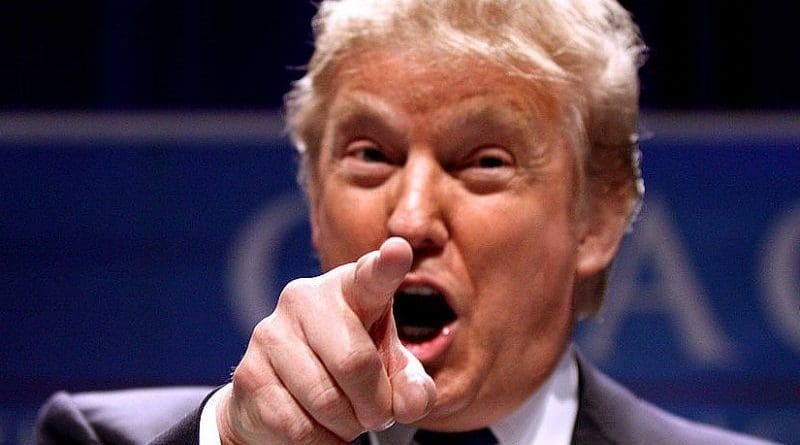Trump’s Ill-Fated China-North Korea Gambit – Analysis
By RSIS
Ahead of a summit with his Chinese counterpart Xi Jinping, President Trump threatened that if China does not impose crippling economic sanctions against North Korea, the US will launch a preventive attack against Pyongyang’s nuclear installations. This attempt at coercive diplomacy will almost certainly fail.
By Evan N. Resnick*
In an interview with the Financial Times last weekend in advance of his impending summit meeting with Chinese leader Xi Jinping, United States President Donald Trump directed a stark ultimatum against both China and North Korea. Insisting that China “has great influence over North Korea,” Trump warned: “If China is not going to solve North Korea, we will. That is all I’m telling you.”
This thinly-veiled threat to take unilateral military action against North Korea’s nuclear assets if China does not tighten the economic noose around Pyongyang was soon followed by the ominous claim by an unnamed senior administration official that “the clock has now run out [on North Korea] and all options are on the table for us”.
Taking Aim at North Korea’s Chinese Enabler
Trump’s coercive diplomacy is premised on the notion that China alone possesses the leverage to ensure that international economic sanctions will exact a crushing economic toll on North Korea. Although the bilateral relationship has frayed in recent years, China continues to be the Democratic People’s Republic of Korea’s sole military ally and its chief source of food, fuel, economic aid, and diplomatic support in international institutions, particularly the United Nations Security Council.
Aggregate trade between the two countries has increased tenfold since 2000, and China currently accounts for a staggering 90% of North Korean trade. Over the past several years, however, China has played a double-game, alternately supporting and undercutting international efforts to sanction North Korea for its proliferation activities.
Three Fatal Flaws
Unfortunately, Trump’s gambit is fatally flawed on three counts. First, it wrongfully presumes that intensified external pressure will compel North Korea into divesting itself of its nuclear arsenal. Like his father and grandfather before him, Kim presides over a small and failing pariah state that is besieged by far wealthier and more powerful adversaries, namely, the United States, South Korea, and Japan.
For weak and highly insecure states such as post-Cold War North Korea, nuclear weapons represent the most potent instrument available to deter attack and subjugation. Even other types of Weapons of Mass Destruction have proven far less effective on this score. To wit, in March 2003, the US invaded Iraq even though the George W. Bush administration (mistakenly) believed that Saddam Hussein possessed stockpiles of both chemical and biological weapons.
By contrast, the US has never launched a war against a nuclear-armed state. Since North Korea’s nuclear programme is driven by insecurity, its inclination to retain, expand, or out of desperation potentially use its nuclear arsenal should only deepen in the face of intensified international pressure.
Second, Trump erroneously assumes that the US can bully China into sacrificing its vital interest in preserving North Korea as a buffer zone. China’s longstanding efforts to prevent international sanctions from ruining the North Korean economy stem from its deep-seated concern that North Korea’s collapse would result in the unification of the Korean Peninsula under South Korean auspices and thereby bring South Korean and US military forces to the southern bank of the Yalu River. It is worth recalling that the last time this happened, in late 1950, a far weaker China evinced no hesitation in launching a full-scale ground war to drive US and Republic of Korea (ROK) troops south from its borderlands.
Lacking Credibility
Third, Trump’s apparent threat to attack North Korea if China demurs is wholly lacking in credibility. At present, North Korea is reported to possess somewhere on the order of a dozen or more nuclear explosive devices, massive stockpiles of biological and chemical weapons, hundreds of ballistic missiles capable of reaching South Korea and Japan, and several thousand artillery guns trained on the South Korean capital of Seoul.
A US-launched preventive war on the Korean Peninsula would be unimaginably destructive for all parties, including the US itself, which has 60,000 troops forward deployed in Northeast Asia. For a preventive strike against North Korean nuclear weapons to succeed, US intelligence would have to predict the number and location of all of those (presumably well-hidden) weapons with perfect accuracy and US air and naval forces would have to successfully destroy all of them in a surprise attack. If even one device survives to be hurled at South Korea or Japan, or placed on a container ship to be smuggled to a US port and detonated, the consequences would be prohibitively dire.
Time to Bring Kim in From the Cold
If the Trump administration genuinely intends to resolve the North Korean nuclear crisis, it will need to part with the long-held US shibboleths that North Korea can be persuaded to relinquish its nuclear arsenal, that China can be persuaded to relinquish its North Korean buffer, and that military force remains “on the table” as a viable last resort for defanging Pyongyang.
Instead, it will have to take a series of politically unpalatable steps to bring Kim and his coterie in from the cold and begin methodically reintegrating the DPRK into the international community. This will involve implicitly acknowledging North Korea as a de facto nuclear power, initiating negotiations to end the now six-decade long Korean War, and fully normalising bilateral diplomatic and economic relations with the DPRK. All the while, it will have to coolly and steadfastly maintain its formal commitments to the defence of South Korea and Japan which have successfully deterred North Korean aggression since 1953.
Evan N. Resnick is Assistant Professor and Coordinator of the United States Programme at the S. Rajaratnam School of International Studies (RSIS), Nanyang Technological University, Singapore.

